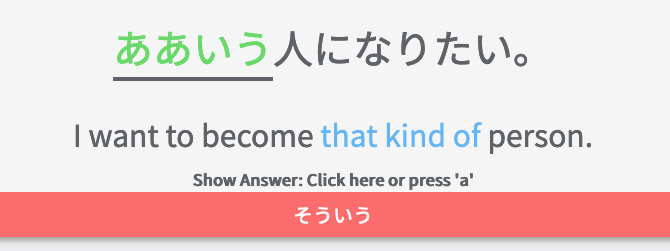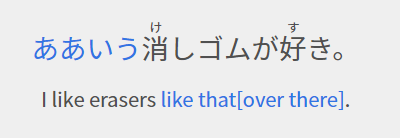like that, kind of
Structure
- こういう + Noun
- そういう + Noun
- ああいう + Noun
- どういう + Noun

こういう、そういう、ああいう mean the same thing as このような、そのような、あのような (and their more casual variant こんな、そんな、あんな)but unlike them - they cannot be used as adverbs, and can only modify nouns. Also こんな、そんな、あんな can be used to criticize someone (そんな人、person like THAT). 〇〇いう do not have that meaning.
In terms of formality: 〇んな<〇〇いう<〇〇いった(past form of 〇〇いう)<〇〇した=〇〇よう
So, こういう、そういう and ああいう describe respectively nature/kind/state/status etc of something that is close to the speaker, close to the hearer and in distance from the speaker and far from both.
They can also refer to what speaker(こういう), hearer(そういう) or a third person(ああいう) has said or done.
俺は車を押してあげる。こういうのはどうですか?
I will push the car. How about something like this?
こういうのは食べたことないよ!
I’ve never tried anything like this! (saying while eating)
A:すみませんが、あいざわさんはこの辺りに住んでいますか?
B:そういう名前の人はいません。
A: Excuse, does Mr. Aizawa live in this vicinity?
B: Person with the name like that does not live here.
そんごくさんはどういう子供でしたか?
What kind of child was Mr. Songoku?
A:彼は騙されたということです。
B:そういうのは聞いたことがありません.
A: I heard that he has been tricked.
B: I have never heard that.
It can be also used in time reference.
こういうこと something that has been just mentioned/happened, そういうこと something that has been mentioned/happened in past, ああいうこと something that has been mentioned/happened long time ago.
2週間前に「バナナが好きだよ」と言った。そういうことを思い出すの?
I have said that I like bananas two weeks ago. Do you remember that thing?
I hope it will clear it a bit.
Thank you very much. It helped a lot 
Can you comment on when どういう is used? Thanks!
Can you kindly consider adding in a soft error or suggestion, upon submission of そういう for this question?
The English translation provided is “I want to become that kind of person.” which could be either そういう or ああいう if I’m not mistaken. Sorry if I’m wrong about this! I’m still learning. 

Sorry about that! I have updated the answers that throw hints/warnings to catch そういう. Cheers!
That’s so kind of you to make that accommodation. You’re no doubt very busy maintaining this app, so I really appreciate you taking the time on this. I know it will help me, and I hope it will also help others. Thank you again.
What’s with the lack of info in this section? It doesn’t state the difference between them…
As highlighted above, the difference between them is the same as the grammar points from N5 on to which they are built on top of - これ, それ, あれ, どれ
these last few days I got confused when to use そういう and そんな
the resources for this point says tobira page 92, but it is just a small table with a few examples.
on the grammar exercise book, how can I find this grammar point so I can practice more??
Why wouldn’t you say when to use each form in the lesson details? It just says “+ noun” with no other information for all four of them. I get it now thanks to @ljoekelsoey that it’s distance but without him I would just be guessing because it didn’t instantly click for me that this was これ、それ
Could you guys please give some context in the lesson when each one should be used
What is the difference between the parts of this grammar point and the parts of
N4 Lesson 5: 9/14 そんな・こんな・あんな・どんな | Japanese Grammar SRS
そんな + Noun
こんな + Noun
あんな + Noun
どんな + Noun
Do they mean the exact same thing?
When I’m look at the example sentences the pairs seems to be translated the same
Excluding そんな / そういう which is given as such as / like that , which means the same thing.
I guess my question is, when do you use the one that ends いう and when do you use the one that ends な
@mrnoone Posted a great detailed explanation above, but I’ll pare it down to just the key points:
From what I’ve seen, こんななど are more casual and can used in a familiar or critical sense as related above, whereas こういうなど are more neutral and describe the state or kind of something, without the connotations of こんななど.
For instance, if a mom were chastising her son for having still not cleaned his room, she might say something like, もう「掃除して」っていったのに、部屋はまだこんなことなのとは? (Despite having already told you to clean it, your room is still in this kind of condition!?) I don’t think you would use こういう in a case like this. It just wouldn’t fit the tone of the sentence.
Oh sorry didn’t see that it was above
Is this also another issue?

I know my answer is wrong but I believe the corrected answer is also wrong 
I’m on beta if that means anything regarding the bug.
It looks like the reddit link in the Online Materials section has been edited/deleted